Bamiyan Province, part 1
May 13th, 2010
Hazarajat, the central highlands of Afghanistan
is home mostly to the Hazara people, those who are descendants from Central Asia, including Genghis Khan’s destructive hordes. For the past two weeks I’ve been visiting a few of their communities in the province of Bamiyan. I’d been invited by LEPCO to visit their Leprosy and TB clinics in Yakolang (and Panjao, (meaning Five Rivers) but the roads were flooded with the spring snow melt and rain.) As all villages and towns in the area, it is long and narrow, following the course of the river. 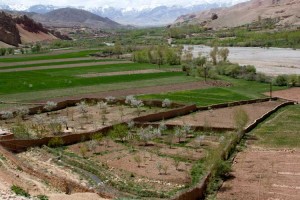 LEPCO has a different policy from other TB NGOs in that instead of just handing out the TB medicine, they collect the patients from their homes and bring them to the clinic so that they don’t spread the disease further while being cured. They feed and house the men and women for two months until the bacillus is no longer visible in their solar-powered microscope. I talked with a few of the women.
LEPCO has a different policy from other TB NGOs in that instead of just handing out the TB medicine, they collect the patients from their homes and bring them to the clinic so that they don’t spread the disease further while being cured. They feed and house the men and women for two months until the bacillus is no longer visible in their solar-powered microscope. I talked with a few of the women.
Many are from impoverished remote areas and they brought very little with them. They sat around all day waiting for their food and another day to pass. They asked me for help to improve their lives. TB spreads so quickly among these poor people because their diets are so deficient. The questions I came away with are how to help Jawad, the LEPCO director in his personal quest to aid these women. (and men. Although I didn’t talk with any of them, their problems are similar—lack of income in these areas where farming is so marginal.) One thing I’m looking for now is an organization who is willing to piggy-back on LEPCO’s infrastructure to provide a teacher (someone from among the educated in Yakolang for the Yakolang clinic, etc.) who can help the women utilize their time with some sort of an educational program. The other thing I’m working on is some sort of income producing activity that can bring in some badly needed cash. Right now, it’s looking like a carpet weaving project might be the most effective. We’re scratching our heads for other ideas.
From there I spent four glorious days in Band i Amir National Park. (Band means lake) The hotel wasn’t open for the season yet, so I stayed with Bulaghi and his family. Since there is no phone service, I just showed up—carefully stepping on the single stones that formed a pathway up the squishy wet hill that oozed with water leaking from the canal above. They opened their living room to me and I made myself at home.
The following day, Bulaghi, who speaks some English, informed me that he was leaving for Bamiyan that afternoon and that I was welcome to stay if language wouldn’t be too much of a problem. I settled into a routine, hiking in the morning, coming back for lunch and a rest, hiking again in the afternoon, returning for supper and electricity to process the day’s pictures. It was amazing how my pictures broke the ice, and Sabina and her kids looked forward to my return so they could see how I saw this area they’d grown up in all their lives.
Pictures opened doors that first afternoon as well when I was invited to attend the first birthday celebration of the village midwife’s first child.
I was welcomed into a room filled with about 20 women and a few children. The midwife spoke some English, so we could get the basics out of the way—I’m from America, married, 58 years old, and my daughters are 26 and 24. I asked if I could take pictures and they excitedly agreed. I’d take a few and then they would crowd around me to see the results.
It was great fun. I loved that on this trip, in this small village, I could collect the images of them on a flash drive and transfer them to the midwife’s computer.
On my second day I visited a school. In all of the schools I’d encountered the school day lasted a half day or less. In this school, there were two morning shifts. I talked with some of the teachers and it seems that nearly all of the children from the three nearby villages attend school. They study science, history, math, Islam, Dari and English. There are about 70 students from three villages and 15 teachers, most educated in Iran during their exile there. Many of the villagers I met enjoyed living in Bamiyan (or never thought about not living there) but some of the teachers felt stifled out there in the hinterlands and longed for a more stimulating life.
The hiking was great. After two months in Kabul with it’s horrific air pollution, ubiquitous soldiers and guns, an inability to walk anywhere and a struggle to remain fit by running up and down the stairs of the SOLA house, this opportunity to be out in gorgeous nature and walking for hours (one day 8 hours) alone was just what I needed.
The weather was chilly but would warm up by late afternoon. By mid afternoon, roiling thunderstorms would saunter in bringing brief showers and then move on. One day when they started to come, instead of turning back, I decided to do what an Afghan would do—find an outcropping to wait it out. When the first heavy drops began to fall, I found a small shelter with a good view of the lake. When I finally crawled out, before me, on the opposite side of the lake was a wall of black clouds from the storm that had just passed and a fully arched rainbow, with a bit of a second one as well.
On my way back, I used the plastic bag I’d brought with me to start picking up trash. I quickly filled that and half of a giant bag that I’d also found among the weeds. Since I’m always on the lookout for
flowers, the sight of trash was especially noxious. As I arrived at the row of stalls, one of the shopkeepers called me over and I showed him what I’d been doing. A park ranger was also there and began saying how bad Afghans are for trashing their park, but I explained that they aren’t bad, just unaware, (There are trashcans about, and the tourists are pretty good about using them, I think; it’s mainly the locals who have no sensibility about it.) and that since they had grown up with trash strewn about, it was like the myriad rocks and went unnoticed. I told them that Band I Amir is a world-class park, if only the trash were removed, both from the park and the village (where the visitors stay). He offered to accompany me the following day and we both set out on a fun adventure, collecting 4 bags on the way. Because he was guiding me, we crossed the Band i Panir (Panir means cheese) Calcium deposits,
waded through the flowing streams, and climbed up the other side.
That night, exhausted, just as I was ready to get into bed, a group of 5 women came and insisted that I join them at a party for their recently married friend who leaving the next day to join her husband. When they told me I should take pictures, I jumped up.
This party was the worst of the old and new. When we arrived, everyone’s eyes were glued to the TV set which had some American adventure program dubbed in Dari. When that finished, they tried to get the DVD player to function and a young boy spent a half an hour working on that while the women just sat around and dealt with the babies. Another woman was trying, without success, to get a tape player going. Meanwhile, one woman started beating a rhythm on a tea tray and several got up and danced,
(myself included, of course), but after a short while they gave up to wait for the technology. After close to an hour, the DVD player sprang to life and a few more women danced, one at a time, to a Bollywood version of MTV. By that time, it was late and we headed back home. Had there been no technology, there would have been dancing the whole time, likely with an instrument or two.
As for the bride, she sat there glum-faced the entire time.
The following day, a group of Belgians from the NGO, Mothers for Peace which has some excellent projects in Istalif, a picturesque village outside of Kabul, came to visit the lakes and bring me back to Bamiyan. I’m so glad I had changed my original plans and chosen to make a longer trip because they had a picnic on one side of the lake, drove around to the opposite side with the shrine and swan boats,
had a ride in them and we left.
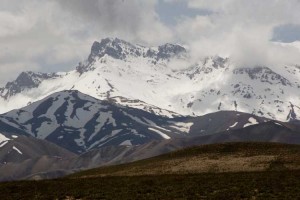
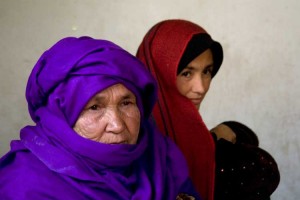
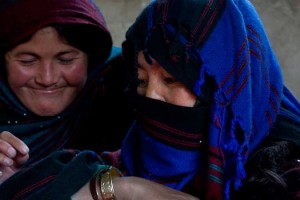
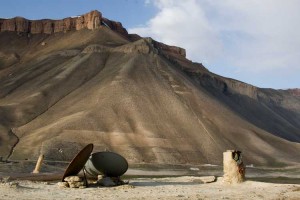
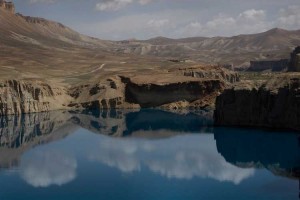
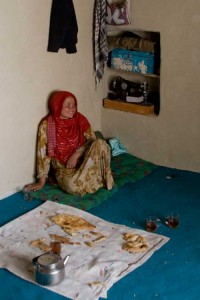
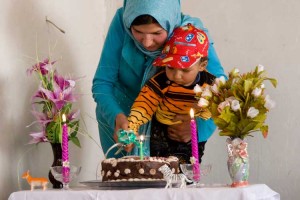
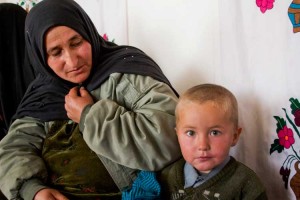
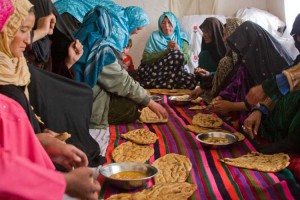
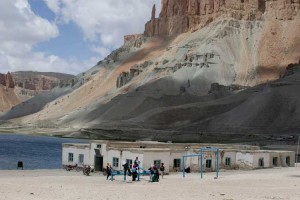
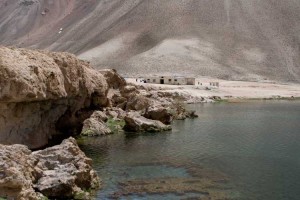
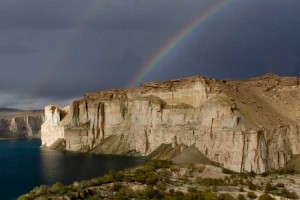
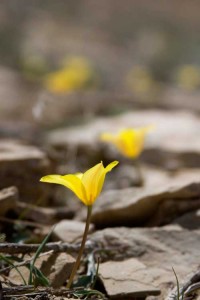
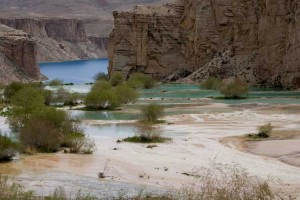
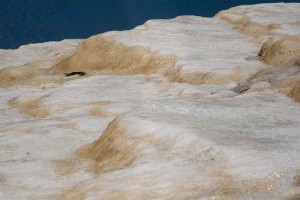
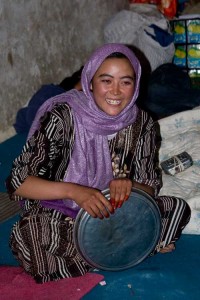
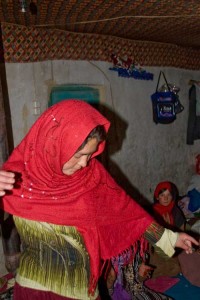
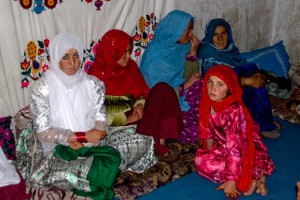
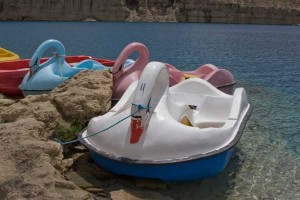
I would like to start off by saying, thank you for supplying me with the information I’ve been looking for. I have been surfing the net for two hours searching for it and would have given my right arm if I would have located your site sooner. Not only did I locate what I was looking for, but also found answers to questions I never even thought to ask myself. Thank you for such a wonderful web-site!
enjoyable